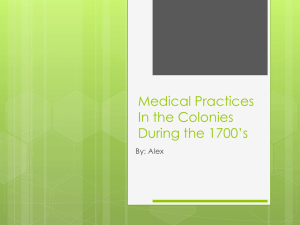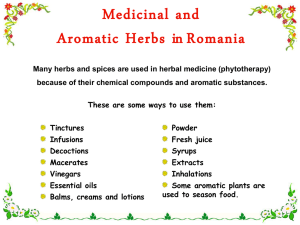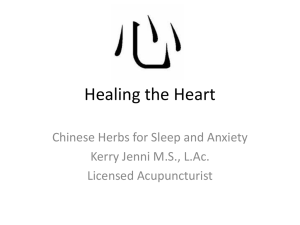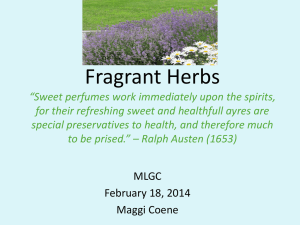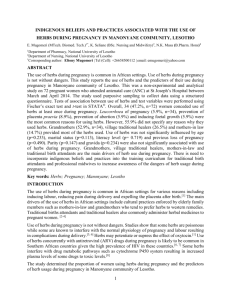Power-Point
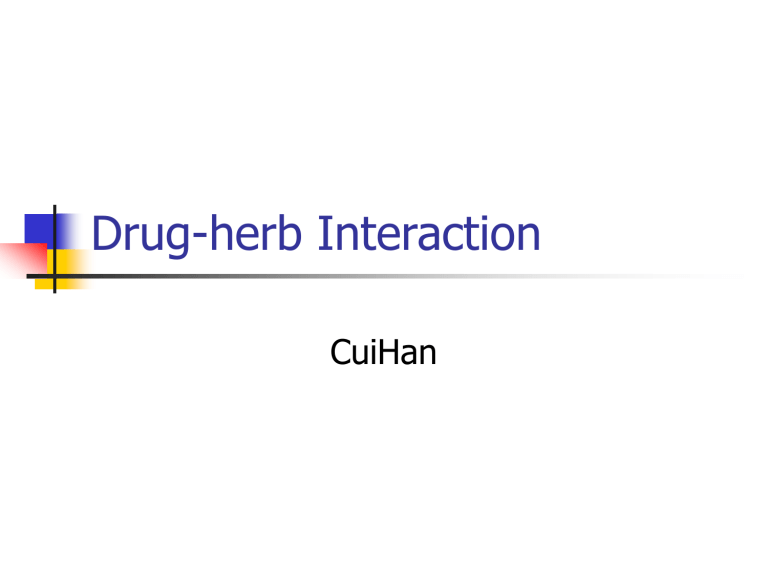
Drug-herb Interaction
CuiHan
Handouts
The interactions of herbs and drugs
Recognition and prevention of herbdrug interaction
Warfarin and chinese medicine
Herb to herb interactions
Mutual accentuation (Xiang Xu): The combination of two substances with similar functions accentuates their therapeutic actions.
Mutual enhancement/assistance/employment (Xiang Shi): The combination of herbs with different actions in which one of the substances enhances the effect of the other in a specific clinical situation.
Mutual counteraction/restraint/fear (Xiang Wei):A combination in which the toxicity or side effects of one substance are reduced or eliminated by another substance.
Mutual suppression/killing (Xiang Sha)
Mutual antagonism/aversion (Xiang Wu): The ability of two substances to minimize or neutralize each other ’ s positive effects.
Herb to herb interactions
Mutual incompatibility / opposition (Xiang
Fan): The combination of two substances gives rise to side effects or toxicity which would not be caused by either substance when used alone.
Eighteen herbs of mutual incompatibility
(Shi Ba Fan)
Gan Cao---Gan Sui, Da Ji, Yuan Hua and Hai Zao;
Wu Tou----Bei Mu, Ban Xia, Gua Lou, Bai Lian, Bai Ji
Li Lu--------Ren Shen, Sha Shen, Dan Shen, Xuan
Shen, Xi Xin, Shao Yao.
Herb to drug interactions
Herbs with drugs for hypertension, seizures, diabetes, thyroid conditions
Diuretic herbs and diuretic drugs may have additive or synergistic effects, making hypertension more difficult to control:
Fu ling, zhu ling, che qian zi, ze xie
Anticoagulant drugs and herbs of blood activating and blood stasis removing function: warfarin and Dan shen, Dan shen, chuan xiong, shui zhi, tao ren, hong hua
Anti-diabetic herbs may interfere with anti-diabetic drugs by enhancing hypoglycemic effects: zhi mu, shi gao, xuan shen, cang zhu, shan yao, huang qi
Teratogenic herbs
Teratogenic herbs are known to have the tendency of causing danger or harm to the fetus during pregnancy and thus leading to birth-defects or spontaneous abortion.
Prohibited herbs: qian niu zi, da ji, ban mao, shang lu, she xiang, e zhu, shui zhi, meng chong
Herbs that should be used with caution are herbs that are pungent and warm in nature and have the functions to activate qi, activate blood circulation and remove blood stasis: tao ren, hong hua, da huang, zhi shi, fu zi, rou gui, gan jiang
The interaction of drugs and herbs
Adverse effects of combining grapefruit juice with drugs for calcium antagonists (lower blood pressure), the benzodiazepines midazolam and triazolam (for depression), and terfendadine (for allergies) are due to the greatly increased amount of drug in the bloodstream due to inhibited drug metabolism.
Zhi shi, zhi ke, ju he, qiang huo, du huo, dang gui, bu gu zhi
Some herbs can increase drug metabolism rather than decrease it, resulting in lower drug availability.
St. John ’ s wort in AIDS treatment
Monoamine oxidase inhibitors (MAOIs) and Essence restoring herbs
He shou wu, shu di huang, sha yuan zi, tu si zi, lu rong
Effects of low levels of monoamines are depression and hypertension. There is an increase in MAO activity with aging.
Those herbs reduce the MAO level and activity
Tetracycline and milk
The interaction with milk is an interaction with calcium in the milk.
Inhibition of the drug ’ s absorption can also occur when taking any mineral rich food or herb, such as oyster shell, dragon bone, gypsum, mother of pearl.
Ginger
Blood thinners and green vegetables
Vitamin K has coagulation promoting qualities that overcome the anticoagulant drug.
Dang gui, Dan shen enhance the warfarin effects.
Steroids and chinese herbs
Many herbs can enhance the circulating levels of corticosteroids by slowing their metabolism.
Enhanced levels of sex hormones in aged individuals may be one of the mechanisms by which antiaging chinese herbs are able to improve patient condition.
Chinese herbs serve as a replacement for the corticosteroid therapy in the treatment of rheumatoid arthritis, viral hepatitis, and enphritis. Fu ling, zhu ling, cang zhu, gui zhi, gan cao.

